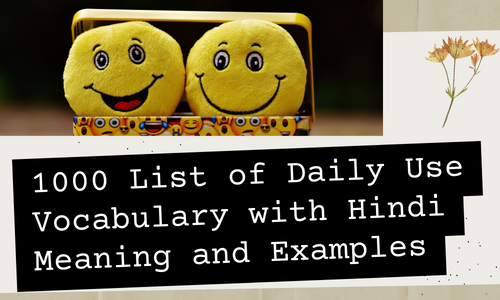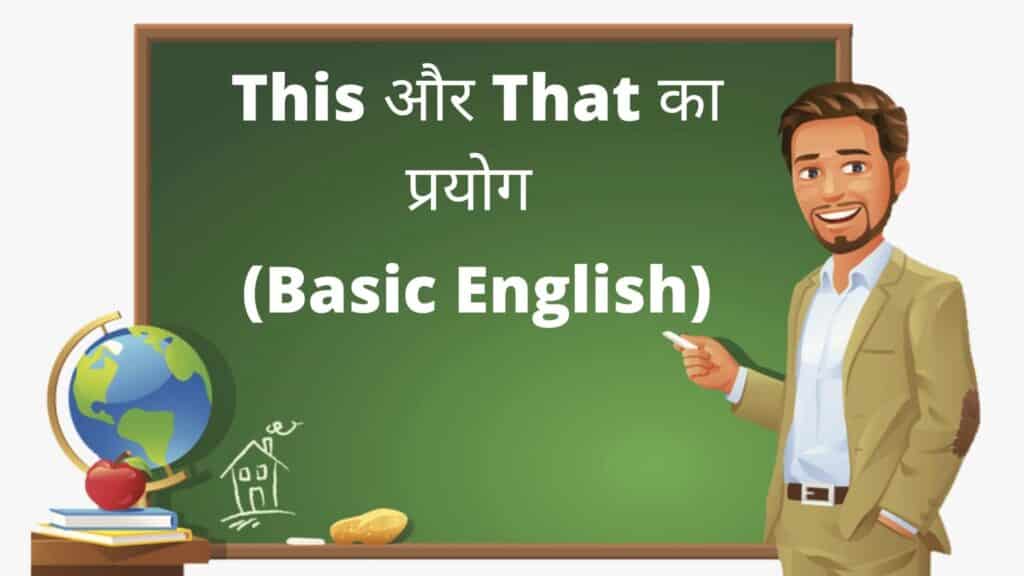List of Daily Use Vocabulary: Are you looking to expand your vocabulary in both English and Hindi? This article provides a comprehensive list of daily use vocabulary with Hindi meanings and examples for easy understanding. Whether you are looking to improve your communication skills or just familiarize yourself with common words, this resource is perfect for you.
Key Takeaways
- Learn daily use vocabulary words in English and their Hindi equivalents.
- Familiarize yourself with common phrases and expressions in Hindi.
- Use examples provided to understand how to use the vocabulary in context.
Greetings and Introductions
Starting a conversation with a greeting and introduction is a common courtesy in any language. Let’s explore some common greetings and introductions in English and their Hindi translations:
| English | Hindi | Example |
|---|---|---|
| Hello | नमस्ते (Namaste) | Namaste! How are you? |
| Hi | हाय (Hāy) | Hāy there! What’s up? |
| Good morning | शुभ प्रभात (Shubh prabhāt) | Shubh prabhāt! Have a great day. |
| Good afternoon | शुभ अपराह्न (Shubh aparahna) | Shubh aparahna! How’s your day going? |
| Good evening | शुभ संध्या (Shubh sandhyā) | Shubh sandhyā! What did you do today? |
| Goodbye | अलविदा (Alavidā) | Alavidā! See you soon. |
Remember to greet people appropriately based on the time of day. Also, it’s polite to introduce yourself when meeting someone new. Here are some useful English and Hindi phrases for introductions:
- My name is… / मेरा नाम है… (Mera nam hai…)
- Nice to meet you / आपसे मिलकर खुशी हुई (Aapse milkar khushī huī)
- What’s your name? / आपका नाम क्या है? (Aapka nam kya hai?)
- Pleased to meet you / आप से मिलके खुशी हुई (Aap se milkar khushī huī)
Try incorporating these greetings and introductions into your daily conversations to make a positive impression.
Numbers and Time
List of Daily Use Vocabulary: Numbers and time-related vocabulary are essential for daily communication. Here, we have compiled a list of English and Hindi words that you can use to express numbers and tell time. Take a look:
| English | Hindi | Example |
|---|---|---|
| Number | संख्या (Sankhya) | There are 10 students in the class. कक्षा में दस छात्र हैं। |
| Time | समय (Samay) | What time is it? वह कितने बजे हैं? |
| Hour | घंटा (Ghanta) | The meeting will start in an hour. मीटिंग एक घंटे में शुरू होगी। |
| Minute | मिनट (Minat) | I will be there in 10 minutes. मैं वहाँ 10 मिनट में पहुँचूँगा। |
| Second | सेकंड (Second) | Hold your breath for 30 seconds. 30 सेकंड के लिए सांस रोको। |
By familiarizing yourself with these terms, you can easily express time and numbers in both English and Hindi. Practice using these words in your daily conversations to improve your language skills.

Weather and Seasons
India is a country of diverse climate and geography, with varying seasons throughout the year. Here are some common weather and season-related vocabulary words that will help you discuss the weather like a native English speaker.
| English | Hindi Meaning | Example Sentence |
|---|---|---|
| Sunny | धूप वाला | It’s a sunny day today. |
| Cloudy | बादलगृहीत | The sky is cloudy today. |
| Rainy | बरसाती | It’s a rainy day today. |
| Windy | हवादार | It’s a windy day today. |
| Snowy | बर्फ के साथ | It’s a snowy day today. |
| Spring | वसंत | I love flowers in spring. |
| Summer | गर्मी | Summer is my favorite season. |
| Fall | पतझड़ | I enjoy the fall foliage. |
| Winter | शीतकाल | I hate driving in winter. |
With these weather and season-related vocabulary words, you’ll be able to talk about the weather with ease and make small talk with anyone!
Food and Drinks
List of Daily Use Vocabulary: Knowing food and drink vocabulary is essential for everyday communication. Here are some commonly used English terms with their Hindi meanings and examples:
| English | Hindi | Example |
|---|---|---|
| Water | पानी (paani) | Please bring me a glass of water. | कृपया मुझे एक गिलास पानी लाओ। |
| Coffee | कॉफ़ी (kaaphi) | Would you like some coffee? | क्या आपको कॉफ़ी चाहिए? |
| Tea | चाय (chaay) | I prefer tea over coffee. | मुझे कॉफ़ी से ज़्यादा चाय पसंद है। |
| Bread | रोटी (roti) | Can I have some bread with my soup? | क्या मुझे मेरी सूप के साथ कुछ रोटी मिल सकती है? |
| Rice | चावल (chaaval) | I prefer brown rice over white rice. | मुझे सफेद चावल से ब्राउन चावल पसंद है। |
| Salt | नमक (namak) | Please pass me the salt. | कृपया मेरे पास नमक पास कर दो। |
It’s important to know how to order food and drinks in Hindi. Here are some examples:
- Can I see the menu, please? | क्या मैं मेनू देख सकता हूँ?
- I would like to order chicken biryani and a mango lassi. | मैं चिकन बिरयानी और एक मैंगो लस्सी आर्डर करना चाहूँगा।
- How spicy is this dish? | यह डिश कितनी मसालेदार है?
- Can I have the bill, please? | क्या मैं बिल मांग सकता हूँ?
By familiarizing yourself with food and drink vocabulary, you’ll be able to confidently navigate menus, order at restaurants, and understand recipes in Hindi.
Daily Activities
Learning vocabulary related to daily activities is essential for efficient communication in both English and Hindi. In this section, we have compiled a list of useful words and phrases that will help you express your daily routine in Hindi.
| English | Hindi |
|---|---|
| Wake up | उठना (uthna) |
| Brush teeth | दांत साफ़ करना (daant saaf karna) |
| Take a shower | नहाना (nahaana) |
| Get dressed | कपड़े पहनना (kapde pahanna) |
| Have breakfast | नाश्ता करना (nasta karna) |
| Go to work/school | काम/स्कूल जाना (kaam/school jaana) |
| Finish work/school | काम/स्कूल समाप्त करना (kaam/school samaapt karna) |
| Cook dinner | रात का खाना बनाना (raat ka khana banana) |
| Watch TV | टीवी देखना (TV dekhna) |
| Go to bed | सोना (sona) |
These words and phrases will help you talk about your daily routine in Hindi and communicate more efficiently with native Hindi speakers. Practice using them in your daily conversations to improve your Hindi language skills!
Emotions and Feelings
Being able to express emotions and feelings accurately is an essential part of communication. Here are some common words and phrases related to emotions and feelings in English and their Hindi equivalents:
| English | Hindi | Example |
|---|---|---|
| Happy | खुश | I am happy to see you! |
| Sad | उदास | She was sad to hear the news. |
| Angry | गुस्सा | He was angry about the situation. |
| Excited | उत्साहित | We are excited for the concert! |
| Nervous | घबराया | She was nervous before her presentation. |
| Surprised | आश्चर्यचकित | He was surprised by the news. |
It’s important to express emotions and feelings appropriately in different situations. By using the right words and phrases, we can convey our emotions effectively and build stronger connections with others.
Transportation and Travel
Whether you are traveling within your city or going to a different state, it’s essential to know the names of various modes of transportation. Here are some words and phrases related to transportation and travel that you should know:
| English | Hindi | Example |
|---|---|---|
| Train | रेलगाड़ी (Railgadi) | I am going to Mumbai by train tomorrow. |
| Bus | बस (Bas) | I prefer taking the bus to work as it’s more convenient. |
| Taxi | टैक्सी (Taxi) | We took a taxi to the airport. |
| Auto-rickshaw | ऑटोरिक्शा (Autorickshaw) | Please take me to the market in your auto-rickshaw. |
| Flight | उड़ान (Udaan) | My flight to Delhi got delayed by two hours. |
You can also use the following phrases in travel-related situations:
- What time does the train/bus/plane leave?
- Where is the nearest bus stop/train station/airport?
- How much does a taxi/auto-rickshaw ride cost?
- Can you recommend a good hotel in this city?
- I need to book a ticket for the next available flight, please.
By learning these vocabulary words and phrases, you can navigate your way through various travel situations in India with ease.
READ THIS ALSO: THIS OR THAT KA PRAYOG
Conclusion
With this comprehensive list of daily use vocabulary with Hindi meanings and examples, readers now have a valuable resource to enhance their communication skills in both English and Hindi. The list covers common vocabulary across various topics including greetings, introductions, numbers and time, weather and seasons, food and drinks, daily activities, emotions and feelings, and transportation and travel.
By familiarizing themselves with these words and phrases, readers can navigate daily conversations with ease, whether they are speaking in English or Hindi. Improving communication skills can help build better relationships with colleagues, friends, and family members, and can also lead to more opportunities in education and employment.
Readers can use this list to expand their vocabulary and practice using the words and phrases in everyday situations. It is important to note that language is constantly evolving, and there may be other words and expressions that can also be useful in daily communication.
Overall, the list provides a solid foundation for building a more robust English and Hindi vocabulary. By taking the time to learn these words and phrases, readers will be able to express themselves more confidently and effectively in a variety of settings.
FAQ
Q: What is the purpose of this list of daily use vocabulary?
A: The purpose of this list is to provide a comprehensive collection of daily use vocabulary words along with their Hindi meanings and examples to help readers enhance their communication skills in both English and Hindi.
Q: What topics are covered in this list?
A: This list covers a variety of topics including greetings and introductions, numbers and time, weather and seasons, food and drinks, daily activities, emotions and feelings, and transportation and travel.
Q: How will this list benefit readers?
A: By familiarizing themselves with the vocabulary in this list, readers will be able to expand their language skills, improve their communication, and navigate daily conversations with ease in both English and Hindi.
Q: Can I use these vocabulary words in my everyday life?
A: Absolutely! This list includes words that are commonly used in daily life situations, making them perfect for incorporating into your everyday conversations.
Q: Are there examples provided for each vocabulary word?
A: Yes, examples are provided for each vocabulary word to demonstrate its usage in context.
Q: How can I use this list to improve my language skills?
A: You can use this list as a reference guide to learn new vocabulary words, practice their pronunciation, and incorporate them into your conversations. Regular exposure and practice will help you improve your language skills over time.
A: Absolutely! Feel free to share this list with anyone who may find it helpful in enhancing their communication skills in both English and Hindi.
Q: Are there any resources available to further expand my language skills?
A: Yes, there are many resources available such as language learning apps, online courses, and language exchange programs that can further help you expand your language skills.



